#George Atzerodt
Text
In honor of me getting to go to Berlin soon
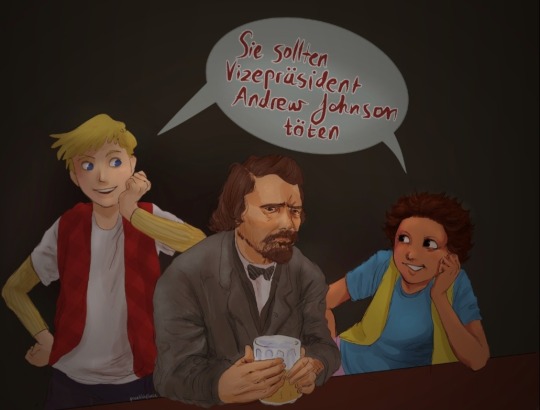
I don't know any other German people.
#there is no overlap for these communities#george atzerodt#rolli und rita#hallo aus berlin#my art#acctag: presidents
24 notes
·
View notes
Note
I adore Tobias Menzies and loved watching Manhunt. The last episode prompted a discussion between my coworker and I…
Was Johnson involved?
Andrew Johnson was a lot of terrible things and you won't find me defending him for pretty much any reason, but he wasn't involved in Lincoln's assassination. It was easy to raise questions about him because he was a Southerner and a slaveowner, but he was loyal to the Union throughout the Civil War -- the only Senator from a state that joined the Confederacy who remained loyal -- and one of the last things he would have done was join in a conspiracy with the Southern aristocracy that he hated with a passion during his entire political career. The fact that he had extremely adversarial relationships with Stanton and General Grant also didn't help his cause when some folks started pointing fingers at him after Lincoln's assassination.
But if John Wilkes Booth's conspiracy had been carried out as intended on the night of April 14, 1865, then-Vice President Johnson would have been assassinated the same night that Lincoln was killed and Secretary of State Seward very nearly was. Right around the time that Lincoln was shot by Booth and Seward was viciously attacked in his home by Lewis Powell, George Atzerodt was supposed to kill Johnson at the hotel where Johnson was living after his inauguration as Vice President a month earlier. Atzerodt, however, lost his nerve and ended up getting drunk instead -- but was still executed for his role in the conspiracy.
By the way, I also don't think Confederate President Jefferson Davis had any sort of role in planning or ordering Lincoln's assassination. Davis and the Confederate government had already abandoned Richmond when Lincoln was killed, and it was clear that the war was basically over. Davis -- who also hated (and was hated by) Andrew Johnson -- recognized that President Lincoln was going to be the South's best bet for a Reconstruction that would help rebuild the former Confederacy without extreme punitive measures. There were definitely Confederate sympathizers and Confederate secret service operatives who were in contact with Booth over the years, and many of them were Northern business leaders with longstanding connections in the Southern states or who were angry over the abolition of slavery and its economic impact. But killing Lincoln -- especially at that point -- was far worse for the South because it led to Andrew Johnson as President, and Johnson really was probably the last person in America who Jefferson Davis would have wanted to be President of the United States. Operationally, it would not have made sense for Davis to order Lincoln's assassination, particularly at that time.
In his post-war book, The Rise and Fall of the Confederate Government (BOOK | KINDLE), published in 1881, Davis wrote about learning of Lincoln's assassination and realizing what Andrew Johnson's succession meant:
"For an enemy so relentless in the war for our subjugation, we could not be expected to mourn [Lincoln's death]; yet, in view of its political consequences, it could not be regarded otherwise than as a great misfortune to the South. [Lincoln] had power over the Northern people, and was without personal malignity toward the people of the South; his successor [Andrew Johnson] was without power in the North, and the embodiment of malignity toward the Southern people, perhaps the more so because he had betrayed and deserted them in the hour of their need...
Lincoln had been assassinated, and a vindictive policy had been substituted for his, which avowedly was to procure a speedy surrender of the army upon any terms. His [Lincoln's] evident wish was to stop the further shedding of blood; that of his successors [Andrew Johnson]...was to extract all which it was possible to obtain...it is clearly to be inferred that, but for the untimely death of Lincoln, the...wounds inflicted on civil liberty by the 'reconstruction' measures might not have left their shameful scar on the United States."
#History#Assassination of Abraham Lincoln#Lincoln Assassination#Presidents#Abraham Lincoln#President Lincoln#Booth Conspiracy#Andrew Johnson#President Johnson#Presidential Assassinations#Conspiracies#John Wilkes Booth#George Atzerodt#Lewis Powell#Jefferson Davis#President Davis#Confederate States of America#Confederacy#Confederate History#Civil War#Civil War History#End of the Civil War#Politics#Political Conspiracies#Edwin Stanton#Manhunt#Apple TV
13 notes
·
View notes
Text
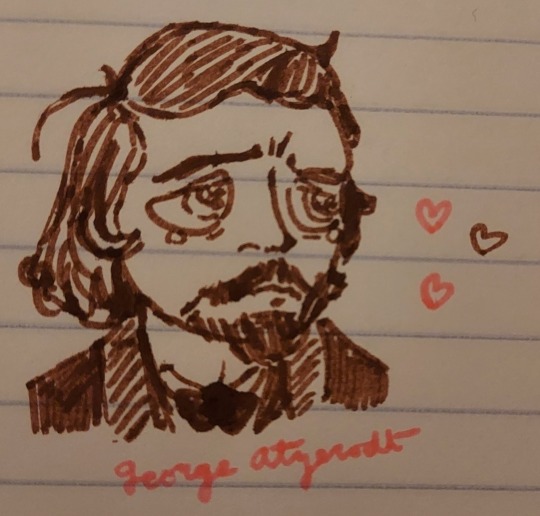
doodling
10 notes
·
View notes
Text


Assassin cats the sequel with some added ones cause why not
#decided to redo a bunch for extra stickers#rays art#history#assassins#john wilkes booth#charles guiteau#leon czolgosz#lee harvey oswald#giuseppe zangara#lynette fromme#sara jane moore#john hinckley jr#sam byck#david herold#lewis powell#george atzerodt#james earl ray#sirhan sirhan#arthur bremer#richard lawrence#dan white#john schrank#luigi lucheni#dmitri bogrov#gavrilo princip#richard pavlick#margaret nicholson#charlotte corday#brutus#anthony babington
15 notes
·
View notes
Note
"I assume you mean 54''40', which means we have the Independent Kingdom of Oregon, and I am 100% behind this concept."
Whoops, thanks for catching that.
Allow me to add more then! The Pig War was an actual war that briefly broke out between the two nations. However, it ended shortly after the South seceded when Abraham Lincoln signed a treaty recognizing the kingdom's sovereignty and other perks in exchange for not supporting the Confederacy.
This was a deeply controversial move at the time, but northerners were soon distracted by the actual Civil War. The South was furious at the deal and still haven't forgiven this hypothetical 54/40 kingdom for "selling them out". For years American media sympathetic to the South showed them as backstabbing weasels (minus the few who came and fought for the South), while sources sympathetic to the North treated them better.
For what its worth, the little kingdom likes Abe Lincoln a lot.
When the Oregon War of Secession broke out, Polk offered US military support under the assumption that Oregon would enter the Union upon gaining independence from Canada. When this didn't happen, Polk was incensed by the betrayal, but the controversy over all the other territory the US had gained in the Mexican War made pursuing the issue a non-priority. After it established a monarchy, Oregon was seen as little more than a satellite state to Britain, and the US refused to recognize its sovereignty. There were calls over the years for US invasion, since this monarchy was an affront to every American ideal, but nothing happened until 1859, when a disagreement involving a pig turned into a full-blown border dispute between the US and the little kingdom.
The conflict remained mostly diplomatic, but a few skirmishes led to a handful of deaths. A cabal of US generals and diplomats, encouraged by Buchanan's Secretary of War, kept the war from resolving too quickly, as they hoped to keep the US distracted in the event of Southern secession.
When Lincoln assumed office in 1861, his priority was to end the war as quickly as possible. He believed the US had no claim to Oregon, and that the Southern states had no right to secede; the US needed all possible forces available in the event war broke out with the South. However, he had to tread carefully; his reputation had suffered from his vocal opposition the Mexican War in 1846, and capitulating too quickly here would make him look weak and unpatriotic. Fortunately, Seward, as Secretary of State, was able to use treaty proceedings as an important facet of his maneuvers to keep Britain from recognizing the Confederacy. By withdrawing all claim to the lands claimed by Oregon, and recognizing that nation's sovereignty, the US ensured that Britain would maintain its alliance with Oregon and withdraw from making one with the Confederate states. The treaty was signed on April 9, 1861. The outrage in the US was quickly silenced by the firing of guns at Fort Sumter only three days later. Over the course of the war, Oregon proved itself a friend of the north and an enemy of the south.
Lincoln endured much criticism when he refused to make a similar peace with the Confederate states, but he maintained that the two situations were entirely dissimilar, since Oregon had never joined the Union. The South tried to cast Lincoln as a supporter of monarchies and a would-be American king, but in fact, to many minds, Lincoln's actions with Oregon undercut the South's claims that he was a grasping, tyrannical dictator and made the South seem belligerent and unreasonable. Some historians believe Lincoln's actions with Oregon may have saved his life. In 1865, when George Atzerodt warned the president of a conspiracy against his life, he claimed he did so with thoughts of Oregon in mind, as he could not make himself believe, as his co-conspirators claimed, that the man who ended that war was a tyrant.
After Lincoln's second term in office ended, he and his wife toured through the Americas. He arrived in Oregon on April 9, 1870 to a hero's welcome. A monument exists within the now-named Lincoln Square commemorating the speech he gave there honoring the friendship between the two nations. Lincoln visited Oregon several times over the course of his life, claiming it was the one place on the continent he could be sure he had no enemies. The Lincoln Memorial in Washington was partially funded through a generous donation from Oregon's royal family, and it remains among the most popular tourist destination for travelers from that kingdom.
#answered asks#adventures in writing#history is awesome#(even alternate history)#(i initially wanted to make this a dialogue between people in a history class in this world)#(but i had too many boring details to fit in so i went for the info dump)#presidential talk
8 notes
·
View notes
Text
Blood On The Hill - TV Pilot
BLOOD ON THE HILL
(Pilot episode)
"My Enemy, My Friend"
FADE IN:
EXT. SURRATT BOARDING HOUSE WASHINGTON D.C. 1865 - NIGHT
Horses tied to hitching posts in front of the boarding house. People walk past.
SUPER: "WASHINGTON D.C. APRIL 14, 1865"
INT. SURRATT BOARDING HOUSE - CONTINUOUS
JOHN HARRISON (early 40's) lies on a bed in a room in the boarding house. He overhears the others in the next room.
MAN #1
David Herold is going to bring Powell to Seward's house. Powell will kill Seward. George Atzerodt will get Vice President Johnson and Booth is at Ford's Theater right now.
The action changes to another room in the boarding house. There are three men: MAN #1, MAN #2, and MAN #3. All about 30 years old.
MAN #2
Who changed the plans?
MAN #1
Booth. He'll kill Lincoln. We need to get fresh horses and supplies so they can make it to the Surratt tavern. And from-
The back door to the boarding house is heard - SLAMMED SHUT.
INT. HALLWAY OF THE BOARDING HOUSE - CONTINUOUS
The three men in the room run into the hallway and see the back door is shut.
SARAH SLATER (mid 30's) is half way to the back door when the men enter the hallway.
MAN #1
(to Slater)
Sarah, did you see who went out the back?
Sarah turns to face them.
SLATER
The boarder, John Harrison.
MAN #2
He overheard the plan. He must be heading to Ford's theater.
Slater runs out the back door. The men start to run out the front door. The third man, Man #1 stops.
MAN #1
My horse is out back.
Man #1 runs out the back door. The others continue out the front.
EXT. THE BACK DOOR SURRATT'S BOARDING HOUSE - CONTINUOUS
Man #1 steps out the back door and looks around.
MAN #1
Where's my horse?
EXT. FORD'S THEATER FRONT ENTRANCE - CONTINUOUS
INT. FORD THEATER - CONTINUOUS
Harrison runs past the THEATER EMPLOYEE in the front lobby.
THEATER EMPLOYEE
Sir, no one is admitted after the show has started.
HARRISON
Did you see John Wilkes Booth come in here?
THEATER EMPLOYEE
Yes, are you a friend?
HARRISON
Yes, is he here?
THEATER EMPLOYEE
He said he was going to greet the President.
HARRISON
How do I get to the President's seat?
THEATER EMPLOYEE
(pointing)
Down that hallway and up the stairs.
Harrison runs down the hall. Slater is at the end near the stairs.
THEATER EMPLOYEE
But the guard won't let you in.
HARRISON
(as he approaches Slater)
Sarah, get out of here. You could be implicated. Booth is planning to get the President.
SLATER
Yes, I know, I'm here to help. Follow me.
Harrison follows her.
PER-LAP
TELEVISION NEWS ANCHOR
And in local news, Senator John Harrison was in Tysons Corner today…
DISSOLVE TO:
INT. HARRISON'S HOME IN WASHINGTON D.C. - NIGHT
Harrison stands in the kitchen. A Television in the kitchen is tuned to a local news channel. Harrison's picture is on the TV screen, behind the news anchor.
TELEVISION NEWS ANCHOR
He held a press conference to discuss his bill The Trafficking Awareness Health Care Act.
Harrison is dressed very conservatively in a dark suit, white shirt, and tie. He loosens his tie as he walks through the kitchen. He rubs his neck. A scar is visible.
B.G. The news cast continues.
He opens the refrigerator and takes out a BOTTLE OF BLOOD marked type O. He pours a glass.
His FANGS show as he brings the glass to his mouth. He drinks the entire glass. He rinses the glass and puts it in the sink. He picks up the remote, turns off the TV, turns out the light and leaves the kitchen.
EXT. PUBLIC PARK - ROCHESTER NY - NIGHT
SUPER: "PRESENT DAY"
Congressman TOM CONLIN (40's) stands alone. He ties his jogging shoe laces and then jogs away. The bushes behind him move due to someone, or something, disturbing them.
INT. TV STUDIO TALK SHOW - NIGHT
John Harrison (still looks like late 30's or early 40's), and the TALK SHOW HOST of "Capitol Hill News" are in the studio.
INT. - NEW YORK STUDIO - CONTINUOUS
Democrat U.S. Senator DENNIS CARNEY (Mid 40's) is at a remote studio in New York State.
INTERCUT - TV STUDIO TALK SHOW/NEW YORK STUDIO/PUBLIC PARK
The scene continues to shift between the studios and the park.
TALK SHOW HOST
In case you're just joining us, we're talking with Republican Senator from Virginia, John Harrison, who's here in the studio with me. Democrat Senator from New York, Dennis Carney, is in our New York Studio.
The talk show host turns to Harrison.
TALK SHOW HOST
Senator Harrison, I understand you are going to Beijing.
HARRISON
Yes. We intend to clear the way for development there.
CARNEY
That's right, after the trade deficit we have with them, he's going to go and clear the way for his campaign contributors.
TALK SHOW HOST
That's how some see it, Senator Harrison.
HARRISON
And what's the problem with helping to expand American business and interest.
CARNEY
Because you're expanding it where we have a trade deficit. They're practically our enemies.
HARRISON
Lincoln once said, if I make my enemy my friend, haven't I defeated my enemy?
CARNEY
There he goes again, quoting Lincoln.
TALK SHOW HOST
You do seem to have a habit of that Senator.
CARNEY
He quotes him so much, you'd think he knew him.
HARRISON
I wish I had. I'll tell you this, I wish I could have prevented his assassination.
TALK SHOW HOST
Tell us more on why you're going to Beijing.
HARRISON
Benson Supermarkets would like to expand into Asia.
CARNEY
Benson has donated to his campaign.
HARRISON
Can we see your list of donors?
CARNEY
The point is Benson is shipping American jobs to Beijing.
HARRISON
Not at all. Opening a store in another country doesn't send jobs there.
CARNEY
It's money they could invest here. This is the type of nonsense that has my colleague in the House asking the Senate to investigate Senator Harrison.
TALK SHOW HOST
You're referring to Congressman Conlin From New York.
CARNEY
Yes.
City park - Conlin jogging.
TALK SHOW HOST
The feud between Conlin and Senator Harrison has been going on for years.
HARRISON
Yes, it began when I was a Congressman. Conlin continues it.
CARNEY
He has good cause.
TALK SHOW HOST
Senator Carney, you've taken up Conlin's cause against Senator Harrison in the Senate.
HARRISON
He sure has.
TALK SHOW HOST
There's certainly bad blood on the Hill, that's for sure.
CARNEY
We have our reasons.
TALK SHOW HOST
How do you feel about Congressman Conlin's constant attacks and demands of investigations, Senator Harrison?
HARRISON
It's a distraction but, I have my ways of dealing with my enemies.
TALK SHOW HOST
Make them your friend?
HARRISON
My first option, but I can resort to other means.
Conlin jogs in the public Park.
TALK SHOW HOST
We're not going to resolve this tonight. Good luck on your trip to Beijing, Senator Harrison. Senator Carney thank you for joining us. That's going to do it for us tonight. We'll see you tomorrow night on Capitol Hill News.
EXT. PUBLIC PARK - ROCHESTER NY - CONTINUOUS
Congressman Conlin stops, catches his breath, and looks around. There is some movement in the bushes behind Conlin. A car pulls up and Conlin's aid, MARK WALTERS (30's) gets out of the passenger side.
WALTERS
Congressman, there's some news about Senator Harrison.
CONLIN
What is it?
WALTERS
He confirmed he's going to Beijing.
CONLIN
Great, he's going for it. I was afraid he'd back out. We've got him.
WALTERS
Come on, get in. We need to go to D.C. for a Press Conference.
CONLIN
You're right, better coverage in D.C.
Conlin gets in the car and they drive away. Behind where Conlin was standing there is movement in the bushes.
EXT. THE U.S. CAPITAL BUILDING - DAY
Aerial view of the Capital Dome seen from the front.
INT. THE CAPITOL BUILDING - DAY
Congressman Conlin, standing at the podium, conducts a press conference.
CONLIN
The character of Senator Harrison has been questionable for some time. I've questioned his ethics and motives from the time he was a congressman.
REPORTER #1
Is this just another rehash of the same old, same old?
CONLIN
Yes and no. Even if I had nothing new, what's in his past is questionable enough. Time doesn't erase it. He decided to go to Beijing to transact some business. Despite our trade problems.
REPORTER #2
He has the right.
CONLIN
Listen, one of his biggest donors is Benson Supermarkets. They want to expand business into Asia. That's the purpose behind his going there.
REPORTER #1
Are you saying there is something illegal about it?
CONLIN
At the very least unethical.
REPORTER #1
In what way?
CONLIN
Senator Harrison is taking contributions from a business while he is also negotiating a deal for that business with a foreign nation.
REPORTER #3
How do you know he's negotiating?
CONLIN
Because he's going to that foreign nation with his donor client.
REPORTER #2
You don't know he's negotiating.
CONLIN
It has the appearance of impropriety.
REPORTER #3
But you don't know that there is anything improper going on.
CONLIN
Are you familiar with the Foreign Corrupt Practices Act?
REPORTER #3
No.
CONLIN
Well you will be. I'm going to make sure we look into this. That's it for now.
Conlin walks away as reporters keep asking questions.
INT. THE SENATE OFFICE BUILDING HARRISON'S OFFICE - CONTINUOUS
Harrison and his Chief of Staff, MICHAEL STOKES (Early 30's), watch the press conference on TV.
Harrison shuts off the TV as the conference ends.
STOKES
We have to do something about this.
HARRISON
Why? We're within the law.
STOKES
The problem is public perception. Like he said, the appearance of impropriety. It could put too much heat on you in the public eye.
HARRISON
So you think we need to counter his attacks?
STOKES
Yes, especially for three years from now.
HARRISON
If I announce my candidacy for President?
STOKES
What do you mean if?
HARRISON
You realize it depends on who gets elected President this year.
STOKES
I know.
HARRISON
What do you suggest we do?
STOKES
Start with what we have. We know plenty about him.
HARRISON
Like what?
STOKES
We know his habits, his lifestyle. We're reviewing his voting record. And, we've been following him.
HARRISON
Do you have a plan?
STOKES
We know he's an avid jogger.
HARRISON
How does that help us?
STOKES
Go on your trip to Beijing. I'll take care of things here.
Harrison shakes is head.
EXT. U.S. CAPITOL BUILDING - NIGHT
Aerial view of the Capitol Dome at night.
INT. A CONFERENCE ROOM IN THE SENATE OFFICE BUILDING - NIGHT
A number of Senators and members of Congress are in a conference room. Harrison is at the head of the table. In attendance SENATOR FROM MARYLAND, CONGRESSMAN FROM VIRGINIA, CONGRESSWOMAN FROM VIRGINIA, and a few others.
There are a couple of glasses of blood on the tables.
The door to the room opens. Harrison walks in.
HARRISON
Bringing those refreshments in here is not a good idea.
CONGRESSMAN FROM VA
Don't worry we'll take them with us when we leave.
CONGRESSWOMAN FROM VA
It's still not a good idea. What if someone gets past the guard outside the door?
HARRISON
Or, what if someone spills it. Don't do it again.
CONGRESSWOMAN FROM VA
You'd think all of you would know better.
Harrison looks around.
HARRISON
Not a very good turn out.
SENATOR FROM MD
That's because congress isn't in session.
CONGRESSWOMAN FROM VA
Only those of us from Maryland and Virginia are here for this meeting.
HARRISON
Then why was it called? What's the big issue.
SENATOR FROM MD
The big issue is you're getting too much exposure.
HARRISON
What do you expect? I've been in the Senate two terms.
CONGRESSMAN FROM VA
Yes, but it's the kind of attention you're drawing.
HARRISON
Look, I can't help it if Conlin and his Senate sidekick-
SENATOR FROM MD
Dennis Carney?
HARRISON
Yes, Dennis the Menace.
CONGRESSWOMAN FROM VA
You can't help it if what?
HARRISON
I can't help it if they're going to constantly feud with me.
SENATOR FROM MD
No, but you didn't have to advertise your trip to Beijing.
CONGRESSWOMAN FROM VA
And for what, to work out deals for your campaign contributors?
HARRISON
I went on the talk show with Carney to quiet those rumors.
SENATOR FROM MD
Instead it fueled them.
CONGRESSMAN FROM VA
And kept the spotlight on you.
HARRISON
So?
CONGRESSWOMAN FROM VA
So, we don't need the spotlight on us.
HARRISON
Look, we're in the House and Senate, expect the spotlight.
SENATOR FROM MD
And what are you going to do about the feuding?
HARRISON
I'll take care of Conlin. Stokes, my Chief of Staff, is working on it. Things will be different when I return from Asia.
CONGRESSMAN FROM VA
In the meantime, how do we stop the rumors that you plan to run for President?
HARRISON
We don't.
SENATOR FROM MD
You in the White House? That would be real low profile, wouldn't it?
HARRISON
I'm not worried about it.
CONGRESSWOMAN FROM VA
You should be.
HARRISON
Why?
SENATOR FROM MD
Because old Senators can fade way.
CONGRESSMAN FROM VA
Old Presidents can't.
CONGRESSWOMAN FROM VA
Have you thought about that?
SENATOR FROM MD
After Presidents leave office they stay in the public eye, Senators don't.
HARRISON
I'll cross that bridge when I get to it.
CONGRESSWOMAN FROM VA
You've been through this before.
HARRISON
About a hundred years ago.
CONGRESSMAN FROM VA
And you backed down then.
HARRISON
It was time to recycle and hibernate.
SENATOR FROM MD
Disappear and reinvent yourself.
CONGRESSWOMAN FROM VA
Which is what you should do now.
SENATOR FROM MD
My point exactly.
CONGRESSMAN FROM VA
A vampire President can be trouble for all of us.
CONGRESSWOMAN FROM VA
It's bad enough some people think Nixon was one of us.
HARRISON
Just let me handle it. One of us in the White House has it's benefits.
Harrison gets up and leaves.
INT. A HOTEL IN BEIJING A CONFERENCE ROOM - NIGHT
Harrison is with his campaign donor JOSEPH BENSON (50's), from Benson Supermarkets and a Beijing business man, BOLIN CHEN (50's).
HARRISON
I'm going to leave you two alone to discuss your business. I'll be in the lobby.
BENSON
Oaky, Bolin and I can discuss our options. We'll get you when we're done.
CHEN
(Mandarin accent)
Fine Senator. I am sure we can work this out.
HARRISON
It's best I stay out of it.
Harrison leaves the room and shuts the door behind him.
INT. HOTEL LOBBY - CONTINUOUS
Harrison walks out to the lobby and sits on a couch. The lobby is empty.
INTERCUT: HOTEL CONFERENCE ROOM/ HOTEL LOBBY - CONTINUOUS
The scene shifts between the conference room and the lobby.
INT. A HOTEL IN BEIJING A CONFERENCE ROOM - CONTINUOUS
Benson and Chen continue their discussion.
BENSON
You know this is going to cost quite a bit.
CHEN
How much?
BENSON
Perhaps 100 million U.S. Dollars for starters.
RESUME IN THE HOTEL LOBBY.
Harrison has his finger near his ear, like he is listening. He jumps up and looks startled. He pauses a second and runs out the front door of the Hotel and is gone down the street.
RESUME IN THE CONFERENCE ROOM:
Men in plain clothes, guns drawn, break in through a back door in the conference room.
SAUNDERS FBI AGENT
FBI. Freeze. Put your hands up.
FBI AGENT #2
Where's Harrison?
BENSON
In the lobby.
FBI Agent #2 runs out to the lobby.
RESUME IN THE HOTEL LOBBY
FBI Agent #2 Looks around the lobby. Harrison is not in sight. The agent returns to the conference room.
RESUME IN THE CONFERENCE ROOM
FBI AGENT #2
He's gone, someone must have tipped him off.
CHEN
How? He just walked out a minute ago.
FBI AGENT #2
Well, he's gone. He couldn't have heard us all the way in the lobby.
SAUNDERS FBI AGENT
How could he disappear that quickly?
FBI AGENT #2
Who tipped him?
CHEN
It wasn't us.
BENSON
What's this about?
SAUNDERS FBI AGENT
It's about bribing foreign officials.
BENSON
What foreign official?
FBI AGENT #2
(pointing at Chen)
Him.
CHEN
I'm a business man.
BENSON
He's not a foreign official.
SAUNDERS FBI AGENT
No matter. Cuff them and let's go.
INT. A PARTY HOUSE ROCHESTER NY - NIGHT
There are banners in the room "Re-Elect Sarah Slater to New York Assembly."
SARAH SLATER (still looks like mid 30's) very attractive, speaks to the crowd. She is dressed like it's a press conference.
Applause in the room, dies down.
SLATER
Thank you everyone for making this a successful fund raiser. A special thanks to my Chief of Staff, Jack Townsend. I plan to continue to serve Rochester as assemblywoman. Everyone enjoy the rest of the evening.
Applause.
Slater steps away from the microphone and approaches her chief of staff, JACK TOWNSEND (mid 40's). He is dressed casually.
TOWNSEND
My work is done here.
SLATER
Thanks again, Jack.
TOWNSEND
I'm headin' home.
SLATER
Good night. I'm heading home soon myself. It's been a long day.
Townsend leaves. Slater returns to the crowd.
EXT. PARTY HOUSE - CONTINUOUS
Townsend exits the party house through the door leading to the parking lot. He continues walking.
EXT. PUBLIC PARK - ROCHESTER NY - CONTINUOUS
Conlin is jogging. He stops. He bends over, puts his hands on his knees, and takes a deep breath.
Suddenly someone jumps out from between the bushes, grabs Conlin, and drags him behind the bushes.
EXT. PUBLIC PARK - ROCHESTER NY - DAY
TWO ROCHESTER POLICE OFFICERS in uniform, examine the taped off crime scene.
OFFICER #1
Looks like he was murdered somewhere else and dragged here.
OFFICER #2
I think you're right. Not much of a struggle here, just some evidence of movement.
A WOMAN OFFICER in uniform, approaches.
WOMAN OFFICER
That looks like Congressman Conlin.
OFFICER #2
How can you tell in that condition?
WOMAN OFFICER
It just looks like him. Any I.D. on the body?
OFFICER #1
No.
OFFICER #2
No wallet. Could have been a robbery.
WOMAN OFFICER
He was jogging he probably left it in his car.
OFFICER #1
Then why drag the body back here through the bushes after the murder?
OFFICER #2
We've got other officers looking around to see if a struggle happened nearby.
OFFICER #1
Have them check for parked cars.
WOMAN OFFICER
What makes you think he was murdered elsewhere?
OFFICER #1
Look at his condition, he looks mangled. But, not much evidence of a struggle.
OFFICER #2
There's also little blood here. It's like he bled to death and was brought here later.
OFFICER #1
Or, at least after the blood clotted.
OFFICER #1
(to the woman officer)
Call the congressman's office. See if they have anything on his whereabouts.
WOMAN OFFICER
So you think it's Conlin?
OFFICER #1
No, but you do.
The woman officer pulls out her cell phone and walks away, typing on it.
OFFICER #2
If it's Conlin, we have to call the FBI.
INT. THE SENATE OFFICE BUILDING HARRISON'S OFFICE -DAY
Harrison's SECRETARY/RECEPTIONIST is sitting at her desk. Harrison comes walking in. He looks disheveled.
SECRETARY/RECEPTIONIST
What happened to your trip?
HARRISON
Cut short.
SECRETARY/RECEPTIONIST
Michael said you were coming in.
HARRISON
Where is he?
SECRETARY/RECEPTIONIST
His office.
HARRISON
Has Joe Benson's people called?
SECRETARY/RECEPTIONIST
No.
HARRISON
Call his office and get me someone in charge there.
Harrison walks through the office and stops at Stokes door. He pokes his head in.
HARRISON
My office.
Stokes follows Harrison into his office. Harrison sits at his desk, Stokes sits in a chair in front of it.
STOKES
Want to clue me in?
HARRISON
All I know is I was out in the lobby letting the two of them talk. I could hear the bust going down from the lobby. So I ran. Got on a plane. Here I am.
STOKES
There's been nothing in the news about the bust.
HARRISON
I wonder why?
STOKES
Maybe they're waiting to see what you do.
HARRISON
It's been two days. Not a word?
STOKES
No.
Harrison picks up the remote on his desk and turns on his office TV. The TV is tuned to one of the news stations.
HARRISON
Let's keep an eye on this.
STOKES
Any clue about the bust?
HARRISON
I heard them shout violation of the FCPA.
STOKES
You could hear that all the way in the lobby?
Harrison taps his ear.
STOKES
But wasn't there noise out in the lobby?
HARRISON
No, fortunately it was empty.
EXT. PUBLIC PARK - ROCHESTER NY - DAY
TWO FBI AGENTS are at the scene with two Rochester Police Department Officers. Officer #1 approaches.
ROCHESTER FBI AGENT #1
(to Officer #1)
Do we have a positive I.D.?
OFFICER #1
It's Conlin.
ROCHESTER FBI AGENT #2
Okay, let's find a cause of death and start making a list of the usual suspects.
OFFICER #1
Suspects?
ROCHESTER FBI AGENT #1
His enemies.
OFFICER #2
He's a Congressman, that list could be endless.
ROCHESTER FBI AGENT #2
Fortunately for you, we're the ones working the case now.
INT. FBI OFFICE ROCHESTER NY - DAY
The two FBI agents are in a conference room.
ROCHESTER FBI AGENT #1
I want to know who his friends and enemies in Congress were. What committees he served on. Which ones he may have chaired. What bills he sponsored or co-sponsored, maybe more important, which ones he opposed.
ROCHESTER FBI AGENT #2
Remember, it could have been just a random murder. His staff said he jogged there nearly every night.
ROCHESTER FBI AGENT #1
A victim of habit makes for an easy target.
ROCHESTER FBI AGENT #2
True.
ROCHESTER FBI AGENT #1
The evidence looks like he was murdered elsewhere and brought there.
ROCHESTER FBI AGENT #2
Who would do that?
ROCHESTER FBI AGENT #1
Someone trying to hide something?
ROCHESTER FBI AGENT #2
We should consider friends, acquaintances, possible affairs.
ROCHESTER FBI AGENT #1
We need to call the Capitol City Police Department.
ROCHESTER FBI AGENT #2
Why not the D.C. office of the bureau?
ROCHESTER FBI AGENT #1
Protocol. It's their jurisdiction.
INT. THE SENATE OFFICE BUILDING HARRISON'S OFFICE -DAY
Harrison and Stokes are in Harrison's office. The Television is still on the news channel.
HARRISON
I'm beginning to think the FBI realizes they don't have a case.
STOKES
They should have known that going in.
HARRISON
They may not have cared.
STOKES
Could be that they're dropping it because they missed you.
HARRISON
Or, they're busy trying to get Benson and Chen to implicate me.
STOKES
Implicate you in what? You know there were no violations.
HARRISON
True, unless they want to manufacture something. After all, they did jump the gun on the bust. No one said anything incriminating.
STOKES
You sure?
HARRISON
I heard every word. I stayed just far enough away.
STOKES
What would have made them jump the gun? They must have heard something.
Harrison SCOFFS.
HARRISON
Those fools.
STOKES
What?
HARRISON
Benson said it would cost about 100 million. They must have thought that was a bribe.
Harrison eyes the TV, grabs the remote and turns up the volume.
HARRISON
Hold it. Something about Conlin.
Harrison and Stokes turn their attention to the T.V. There is a photo of Conlin behind the news anchor.
TELEVISION NEWS ANCHOR
Police in Rochester New York are reporting that Congressman Conlin has been found murdered in a public park.
HARRISON
Is that how you took care of it?
STOKES
I had nothing to do with this. He left for Rochester right after his last press conference.
HARRISON
That doesn't exactly exonerate you. You did say you were following him.
STOKES
Here. Not Rochester. We knew he jogged at night in D.C.
HARRISON
What did you expect to gain from knowing he jogged?
STOKES
We figured maybe you could accidentally bump into him off Capitol Hill and talk to him.
HARRISON
Fat chance of him making amends.
STOKES
You're the one who said, make my enemy my friend.
HARRISON
He's never forgiven me for blocking his accounting and finance bill.
STOKES
You were pretty adamant about it.
HARRISON
Because the bill would have left no trust in the financial markets.
STOKES
I know, I know.
TELEVISION NEWS ANCHOR
We are breaking away to a press conference at the Capitol.
The scene cuts away to the press conference.
INTERCUT HARRISON'S OFFICE/CAPITOL BUILDING PRESS CONFERENCE
The scene intercuts between the Harrison's office and the Press conference.
INT. THE CAPITOL BUILDING PRESS CONFERENCE - CONTINUOUS
CARNEY
I called this press conference to express my deep sympathy over the tragic murder of my friend and colleague, Congressman Tom Conlin. My deepest condolences to his family.
REPORTER AT CARNEY CONFERENCE
Senator, do you have any opinion of the comment Senator Harrison made during your appearance together on Capitol City News?
CARNEY
You mean how he would take care of his enemies?
REPORTER AT CARNEY CONFERENCE
Yes.
RESUME IN HARRISON'S OFFICE
HARRISON
He we go.
STOKES
Starting already.
RESUME IN THE PRESS CONFERENCE
CARNEY
Not really. The whole world heard it. Let the police take care of it. We all know of their feud.
REPORTER #2 AT THE CARNEY CONFERENCE
Do you think the feud between you and Senator Harrison will continue?
CARNEY
No further questions.
Carney steps away as the reporters shout out questions.
INT. THE SENATE OFFICE BUILDING HARRISON'S OFFICE - CONTINUOUS
HARRISON
Oh, he doesn't want to comment at this time he just wants to throw some red meat out for the vultures.
TELEVISION NEWS ANCHOR
In case you missed it earlier, this is the comment Harrison made on Capitol City News. The one referred to in the Carney press conference.
Harrison grabs the remote and shuts off the TV with a quick click. He drops it on the desk.
STOKES
You realize that question was a plant?
HARRISON
Ya think?.
STOKES
That's going to be the sound bite of the week.
HARRISON
Completely out of context. Cherry picked.
STOKES
It'll continue until the next big sound bite.
INT. NY STATE ASSEMBLY OFFICE ROCHESTER SLATER'S OFFICE -DAY
Townsend charges into Slater's office.
TOWNSEND
Did you hear about Conlin?
SLATER
No, what about him?
TOWNSEND
He was murdered last night.
SLATER
That's awful.
She looks at Townsend's grinning face.
SLATER
What's with the smile?
TOWNSEND
Do you realize it's an election year?
Slater looks around at the election posters.
SLATER
Yeah.
TOWNSEND
You've made it known you want Conlin's seat in the House someday.
Slater is silent for a while and stares.
TOWNSEND
What's the matter?
SLATER
What's the matter is…I've made it known I want Conlin's seat in the House someday.
TOWNSEND
So?
SLATER
So? Am I going to be a suspect because I voiced my ambitions?
TOWNSEND
Maybe, but don't worry about that.
SLATER
Don't worry about that!
TOWNSEND
Did you murder him?
SLATER
Why would you ask me that question?
TOWNSEND
That's not the right answer.
SLATER
Of course I didn't murder him.
TOWNSEND
That's better.
SLATER
So now what?
TOWNSEND
You announce your candidacy. But to be safe wait until someone else announces first.
SLATER
Wouldn't it be better if I were the first to announce?
TOWNSEND
Maybe if he died of natural causes. And even then only after you expressed your admiration and condolences.
SLATER
What if it's someone I couldn't beat?
TOWNSEND
Of all the possible candidates I doubt there is anyone you can't beat.
Townsend pauses a moment.
TOWNSEND
Just to be safe, I'll go to the Democrat headquarters and ask them to announce that one of the County Legislators in your district is seeking the nomination.
SLATER
What good does that do?
TOWNSEND
Then you announce you're seeking the nomination for Conlin's seat. The legislator steps down.
SLATER
How are you going to convince them?
TOWNSEND
I'll point out how having someone announce then withdraw when you enter will keep this in the news longer for the Democrats.
SLATER
Why are you so concerned that it doesn't look like I killed him.
TOWNSEND
Just being cautious. When you announce your candidacy, you also endorse the legislator for your assembly seat. That way everyone comes out looking good.
SLATER
You seem to have it all figured out.
Slater pauses a moment turns her head away from Townsend then back to him.
SLATER
Did you kill him?
TOWNSEND
Why would you ask me that question?
SLATER
That's not the right answer.
TOWNSEND
It doesn't matter about me, I'm not the one running.
Townsend leaves.
SLATER
Yeah. You're not running.
INT. DOJO IN WASHINGTON D.C. - DAY
SHALLAMAR BOUDREAUX,(30), an attractive and physically fit woman kicks and punches a heavy bag. She is dressed in an all white karate gi and a black belt. The phone at the main desk rings and a MAN AT THE DOJO DESK, dressed in plain clothes answers.
MAN AT THE DOJO DESK
(into the phone)
Yes, she's right here.
The man puts the phone on hold and yells.
MAN AT THE DOJO DESK
Sensei Shallamar, phone call.
BOUDREAUX
(hitting the bag)
Take a message.
MAN AT THE DOJO DESK
It's the Capitol City Police.
Shallamar hits the bag once more, grabs a towel, wipes her face as she walks over to the desk. She answers the phone.
BOUDREAUX
Sergeant Boudreaux.
INTER CUT DOJO/CAPITOL CITY POLICE DEPARTMENT
The scene shifts between the Dojo and the Police department.
INT. CAPITOL CITY POLICE DEPARTMENT OFFICE - DAY
Capitol City Police officer PHILIP KIRBY, (mid-20's) physically fit, sits at his desk.
KIRBY
You weren't answering your cell so I thought I'd try you here.
BOUDREAUX
Good guess Sherlock. What's so important?
KIRBY
Congressman Conlin was murdered last night.
BOUDREAUX
Where?
KIRBY
In Rochester New York.
BOUDREAUX
In Rochester? So what are we supposed to do, fly there and investigate?
KIRBY
They want us to go to the Senate office building and speak to Senator Harrison.
BOUDREAUX
Why him?
KIRBY
They say he made a threat. I'll fill you in when you get here.
Boudreaux hangs up the phone and takes a deep breath.
INT. THE SENATE OFFICE BUILDING HARRISON'S OFFICE -DAY
Senator Harrison sits at his desk. He is on the phone.
HARRISON
(into the phone)
Thanks. This is good to know.
He hangs up the phone.
INT. HARRISON'S OUTER OFFICE - CONTINUOUS
Harrison's Secretary is sitting at her desk. Sergeant Boudreaux and officer Kirby arrive in plain clothes. Boudreaux flashes her badge as she approaches the desk.
BOUDREAUX
We'd like to see Senator Harrison.
SECRETARY/RECEPTIONIST
I'll ask him if he's available.
BOUDREAUX
Suggest to him that he be available.
SECRETARY/RECEPTIONIST
(into the phone)
Capitol City police are here.
She hangs up the phone.
SECRETARY/RECEPTIONIST
Go ahead in.
INT. HARRISON'S OFFICE - CONTINUOUS
Boudreaux and Kirby enter the office
BOUDREAUX
Senator, I'm Sergeant Boudreaux and this is officer Kirby.
The officers take their seats in front of Harrison's desk.
BOUDREAUX
You probably know why we are here.
HARRISON
Should I?
BOUDREAUX
Other than the murder of Congressman Conlin, is there anything else we should be looking into?
HARRISON
What does his murder have to do with me?
KIRBY
Your feud is well known.
HARRISON
Well known, or did you look it up?
KIRBY
It's well known.
BOUDREAUX
And it's easy to look it up. What do you know about the murder?
HARRISON
Am I a suspect?
BOUDREAUX
You're a person of interest.
HARRISON
Why?
KIRBY
You had motive.
HARRISON
As does two thirds of congress and half his constituents.
BOUDREAUX
I'll ask again, what do you know about the murder?
HARRISON
Only what's been reported in the news.
BOUDREAUX
Nothing more?
HARRISON
Why would I know more?
KIRBY
That's what we'd like to know.
BOUDREAUX
Look it's really no secret that you two have been feuding.
HARRISON
Many of us feud.
BOUDREAUX
Not like you two.
KIRBY
Word is it was Conlin who contacted the FBI and set up the sting on your campaign donor.
Boudreaux gives Kirby a stern look.
HARRISON
Who says he was my campaign donor?
KIRBY
He contributed to your Super PAC.
Boudreaux gives him another look.
HARRISON
That's all on public record. I'm not hiding anything, Never do.
KIRBY
Never?
HARRISON
I'm a Senator. What do you think?
Kirby SCOFFS.
BOUDREAUX
Weren't you there when the bust came down?
HARRISON
Should I have an attorney present?
KIRBY
That's not necessary.
HARRISON
Really?
BOUDREAUX
We're not charging you with anything.
HARRISON
How do you know it was Conlin who set me up?
BOUDREAUX
So you were there?
Harrison fidgets a bit.
HARRISON
Not really. But my donor-
KIRBY
Your donor? I thought you said he wasn't your donor.
HARRISON
So you're saying my acquaintance was set up in the hopes that I would be present.
BOUDREAUX
And you're saying you weren't?
HARRISON
Did the FBI say I was?
BOUDREAUX
They saw you go in, but not come out.
KIRBY
And Senator Carney is asking for an investigation.
BOUDREAUX
Violation of the Foreign Corrupt Practices Act.
HARRISON
Which is quite a stretch since I wasn't present.
BOUDREAUX
That remains to be seen from the investigation. Bribing a foreign official is a serious matter.
HARRISON
There is no foreign official and just what would you know about the Foreign Corrupt Practices Act?
BOUDREAUX
I studied the FCPA as an accounting student.
HARRISON
Accounting student? So why did you become a cop?
BOUDREAUX
I have a Bachelor's degree in Accounting and Police Science.
HARRISON
Why, both?
BOUDREAUX
That's needed to become an FBI agent.
HARRISON
So why aren't you with the FBI?
BOUDREAUX
I'm working on it.
HARRISON
Maybe I can help you with that.
BOUDREAUX
What do you mean by that?
HARRISON
You help me in some way and I'll see what I can do to get you in the FBI.
BOUDREAUX
That sounds like a conflict of interest.
HARRISON
Not at all. I wash your back, you wash mine.
BOUDREAUX
Besides a bad visual, that sounds like a bribe.
HARRISON
No how-
BOUDREAUX
How about if we ask the questions?
KIRBY
You started to say something about your accomplice.
HARRISON
Acquaintance.
KIRBY
What did you mean when you said on Capital Hill News, you have ways of dealing with your enemies?
HARRISON
Nothing. Look is there anything you want from me with all this badgering?
BOUDREAUX
Not at this time. The FBI in New York asked us to talk to you.
HARRISON
Why didn't they send agents from their D.C. office?
KIRBY
This is our jurisdiction.
BOUDREAUX
So, where were you when Conlin was murdered?
HARRISON
You know very well where I was.
KIRBY
But you denied being in Beijing.
HARRISON
I said, I wasn't in the meeting.
KIRBY
So you were there. It doesn't exonerate you.
BOUDREAUX
Al Capone was in Florida when his enemies were killed in Chicago on Valentines Day.
HARRISON
Yes, I remember.
KIRBY
You remember?
HARRISON
I recall, okay? Do you have anymore questions? Something specific?
KIRBY
We'd like your personal financial records.
BOUDREAUX
You can turn them over or we'll get a court order for them.
HARRISON
Why? Has this talk of Capone given you the idea of charging me with income tax evasion?
BOUDREAUX
That's the Treasury Department.
KIRBY
We can refer it to them if you'd like.
BOUDREAUX
We're requesting them because the FBI wants them.
HARRISON
You mean they want to see if there's a money trail linking me to Conlin's murder.
KIRBY
Is there?
BOUDREAUX
There may be other things they're looking for.
HARRISON
Tell them get a court order, a warrant or whatever they need for that. In the meantime I'll contact my attorney. This interrogation is over.
Harrison stands and begins to come out from behind his desk.
Boudreaux and Kirby stand, Boudreaux hands Harrison her card.
BOUDREAUX
Here, if you think of anything.
HARRISON
You mean anything that can exonerate me?
BOUDREAUX
Anything that helps us solve the case.
Harrison looks at her card.
HARRISON
Okay,
(reading the card)
Sergeant Shallamar Boudreaux.
Interesting first name.
BOUDREAUX
My mother liked the perfume, but not the spelling. If you think of anything, call.
Boudreaux and Kirby leave. Harrison follows behind, pokes his head into Stokes office and indicates, by pointing, he wants to see Stokes in his office.
Stokes jumps up from behind his desk and follows Harrison into Harrison's office.
HARRISON
Shut the door.
STOKES
What was that about?
HARRISON
Conlin.
STOKES
Were they accusing you?
HARRISON
I'm just one of the suspects. They claim I had motive.
STOKES
Many people had motive. The network keeps showing that clip of you.
HARRISON
Still out of context I'm sure.
STOKES
Of course.
HARRISON
They arrived while I was on a call from our FBI contact in Rochester. It was a vampire who did the killing.
STOKES
Are they saying that on the news.
HARRISON
Are you serious?
STOKES
How can our contact be so sure.
HARRISON
The evidence points to a vampire killing. The police just think the fact that Conlin lost so much blood that he bled elsewhere and was dumped there.
STOKES
So what do we do?
HARRISON
I don't know. What do you know about this?
STOKES
Are you accusing me.
HARRISON
You said you were going to take care of it.
STOKES
Now who's being ridiculous?
HARRISON
Look let's circle the wagons. I did find out one thing from those two, it was Conlin who set up the sting.
STOKES
Now what?
HARRISON
Now we cooperate and just go about business as usual. As for the woman cop, I say we keep her close.
STOKES
Why is that?
HARRISON
She could come in handy for our own needs. She's very sharp.
STOKES
She's also involved in the investigation.
HARRISON
All the more reason to keep her close. Besides, I've got nothing to hide.
EXT. U.S. SENATE OFFICE BUILDING - CONTINUOUS
Boudreaux and Kirby walk to their car.
BOUDREAUX
You realize you gave him information he shouldn't have.
KIRBY
Like what?
BOUDREAUX
Like it was Conlin who set up a sting on him. He now has information that could interfere with the investigation.
KIRBY
I didn't think that was a problem.
BOUDREAUX
And, you told him we know Benson donated money to his Super Pac.
KIRBY
What is that going to hurt?
BOUDREAUX
He now knows we see the financial gain he has.
KIRBY
It's not illegal for him to do that.
BOUDREAUX
No, but it looks unethical. Look, just try not to give out any information that's not necessary. It makes them know what you're thinking and that makes you vulnerable.
INT. MONROE COUNTY DEMOCRATIC HEADQUARTERS NY - DAY
Slater stands at a podium with microphones from several news stations. Campaign signs are on the wall behind her. County legislator MARK GIVENS is with her.
SLATER
I imagine everyone wonders why I called this press conference. It's to pledge my support for Mark Givens for New York State assembly.
The crowd applauds.
SLATER
That's because I am announcing my candidacy for Congress.
More applause.
INT. THE SENATE OFFICE BUILDING HARRISON'S OFFICE -DAY
Harrison sits at his desk with Stokes in the seat in front. The T.V. is on in his office tuned to the station covering Slater's press conference.
HARRISON
Hang on.
Harrison picks up the remote and turns up the volume.
HARRISON
Oh my god.
STOKES
What?
HARRISON
It's Sarah Slater.
SLATER
(on TV)
I'm looking forward to campaigning for Congress and and representing my constituents in Washington.
HARRISON
So, she's running for Conlin's seat. I wonder.
STOKES
You have a history with her or something?
HARRISON
You could say that.
BEGIN FLASHBACK:
INT. SURRATT'S TAVERN SURRATTSVILLE VIRGINIA - DAY
SUPER: "THE SURRATT TAVERN - SURRATTSVILLE VIRGINIA APRIL 1865"
John Harrison walks into the Surratt tavern. He approaches the bar and strikes up a conversation with the bartender. Sarah Slater sits at a nearby table with JOHN WILKES BOOTH.
HARRISON
Excuse me, I wonder if you can tell me where I can find John Surratt.
BARTENDER SURRATT TAVERN
He ain't in.
Sarah Slater appears to overhear the conversation and approaches.
HARRISON
Do you know when he might be in?
BARTENDER SURRATT TAVERN
He's away on business.
SLATER
Excuse me, may I ask what your interest might be with John Surratt? He's a friend of mine.
HARRISON
It's a little personal.
SLATER
His mother may be in later.
HARRISON
His mother?
SLATER
Yes, his mother, most people have them.
HARRISON
I didn't think she would still be alive.
SLATER
Why is that?
HARRISON
I believe John has to be in his 50's so I just thought…
SLATER
Oh. I'm afraid you must have the wrong John Surratt, he's in his twenties.
HARRISON
Yes, I guess I do. I was told that John and Mary Surratt own this tavern.
SLATER
Yes, that would be Mary and John Senior. He passed away a year ago. I thought you meant John Junior.
HARRISON
John Junior?
SLATER
Yes, John and Mary's son.
HARRISON
Oh, of course.
SLATER
What did you want to see John Senior about?
HARRISON
Like I said, it's personal.
SLATER
Would you care to see Mary? She still owns this tavern. She should be at her Boarding house in D.C.
HARRISON
I seriously doubt she would want to hear from me.
SLATER
Sounds like you have a really deep secret.
HARRISON
You could say that.
SLATER
A dark past perhaps?
HARRISON
Perhaps. You mentioned a boarding house. Might there be a room available?
SLATER
A good chance. Why don't you have a seat over here with us and chat for a minute.
Slater walks back to the table and rejoins the man she was sitting with. Harrison follows her.
SLATER
My name is Sarah, and you're?
HARRISON
John Harrison.
SLATER
Really?
HARRISON
Yes, Really. You seem surprised.
SLATER
In a way. Harrison happens to be John Junior's middle name.
HARRISON
Interesting.
SLATER
It is intriguing, isn't it? John Harrison this is John Wilkes Booth.
HARRISON
The actor?
JOHN WILKES BOOTH
That would be me.
HARRISON
What a pleasure to meet you. Are you in town for a performance?
JOHN WILKES BOOTH
No, I have other business to attend to.
HARRISON
I wish you luck with it.
(to Slater)
Listen, I have to head back to D.C. I need to find a room. The Surratt boarding house?
SLATER
It's at 604 H Street North West. Ask for Mary, tell her Sarah Slater sent you.
HARRISON
Thank you, I will do that.
SLATER
You must be disappointed that John Senior is deceased.
HARRISON
Yes, I am.
SLATER
Your deep dark secret intrigues me.
HARRISON
Maybe we'll meet again.
SLATER
Certainly, I spend a lot of time at the boarding house.
END FLASHBACK.
INT. THE SENATE OFFICE BUILDING HARRISON'S OFFICE - CONTINUOUS
STOKES
So you actually met John Wilkes Booth?
HARRISON
Yes.
STOKES
Did you ever tell Slater what your deep secret was?
HARRISON
You mean that I'm John Surratt Senior's bastard son?
STOKES
You are?
HARRISON
Yes. I told her later.
STOKES
Did you ever tell Mary Surratt?
HARRISON
Didn't have a chance to.
STOKES
Why not?
HARRISON
She was hung for the assassination of Lincoln.
STOKES
Seriously?
HARRISON
Seriously, my half-brother's mother.
STOKES
Did you ever see Booth again?
HARRISON
No, I just missed him.
Slater wraps up her press conference in New York on TV.
INT. SLATER'S ROCHESTER OFFICE -DAY
Slater and Townsend are alone in her office.
SLATER
We need to raise more campaign money.
TOWNSEND
I'm way ahead of you. I started a Super Pac.
SLATER
Already?
TOWNSEND
Yes, I'm calling it Cross of Gold.
SLATER
Where did that name come from?
TOWNSEND
Sometimes if you hide things in plain sight, no one notices.
SLATER
Am I missing something?
TOWNSEND
Nothing you need to know. But maybe the cross part will get some religious types to donate.
Slater gives him a confused look.
INT. SLATER'S ROCHESTER OFFICE - RECEPTIONIST'S DESK - CONTINUOUS
FBI Agent Saunders and FBI Agent #2 walk into Slater's office and approach the receptionist.
FBI AGENT #2
(showing his badge)
We're here to see Assemblywoman Slater.
SLATER'S RECEPTIONIST
I'll tell her you're here.
The receptionist picks up the phone and calls Slater.
SLATER'S RECEPTIONIST
The FBI is here to see you.
The receptionist hangs up the phone.
SLATER'S RECEPTIONIST
It's straight to the back.
The FBI agents head back to Slater's office.
INT. SLATER'S ROCHESTER OFFICE - CONTINUOUS
As the agents enter the room, Townsend leaves. They shut the door behind him.
SAUNDERS FBI AGENT
Assemblywoman, can you tell us where you were the night congressman Conlin was murdered?
SLATER
Why?
SAUNDERS FBI AGENT
Just answer the question please.
SLATER
You certainly don't believe I killed him?
FBI AGENT #2
And why wouldn't we?
SLATER
From what I read in the paper, the killing was awfully violent. Do you really think I'm capable of doing that to anyone?
SAUNDERS FBI AGENT
At this point everyone is a suspect.
FBI AGENT #2
You had the most to gain from his murder.
SLATER
Maybe you should talk to the Republican candidate for congress.
FBI AGENT #2
We've done that already.
SLATER
Gee, and I thought you said I was the most likely suspect.
SAUNDERS FBI AGENT
No, we said you had the most to gain.
SLATER
So did his Republican opponent.
FBI AGENT #2
Where were you the night he was murdered?
SLATER
I was at a campaign fund raiser. A dinner with my staff and my supporters. You can verify it.
SAUNDERS FBI AGENT
Okay, we will do that. That's all for now.
SLATER
So now what? You gonna tell me not to leave town?
FBI AGENT #2
No.
SAUNDERS FBI AGENT
Not yet anyway. We will have to talk to your staff as well.
Saunders looks at Slater and addresses her
SAUNDERS FBI AGENT
Shall we meet your staff.
SLATER
Sure, this way.
Slater leads the agents out of her office into the outer office.
INT. TOWNSEND'S HOME - NIGHT
Townsend sits in his living room; decorated like a red neck's humble abode. A Confederate battle flag is on the wall. He reads the newspaper. Country music is playing on his stereo.
INT. A CONFERENCE ROOM IN THE SENATE OFFICE BUILDING - NIGHT
The room with a conference table in the middle. All the seats are filled. Included are Congresswoman from VA, Congressman from VA, MAN SENATOR FROM NV, MAN SENATOR FROM PA, and WOMAN SENATOR FROM WI.
Harrison is at the head of the table and addresses everyone.
HARRISON
Do we have anything new to report?
There is silence. All the members exchange looks.
CONGRESSWOMAN FROM VA
Yes. We've decided that you need to lay low for a while.
CONGRESSMAN FROM VA
You're front page news right now.
MAN SENATOR FROM PA
Sort of like the Mafia Don being in the news too much.
MAN SENATOR FROM NV
It draws too much attention to us.
HARRISON
Are you all crazy? They don't know we exist.
CONGRESSMAN FROM VA
We'd like to keep it that way.
HARRISON
What makes you think I had anything to do with any of these accusations?
CONGRESSWOMAN FROM VA
You're not being accused.
HARRISON
Suspected then. How about some support? You can't possibly believe I'm guilty.
WOMAN SENATOR FROM WI
What we think is not important, it's what the media thinks.
MAN SENATOR FROM NV
And that influences what the public thinks. It reflects on all of us.
HARRISON
The Republican party?
WOMAN SENATOR FROM WI
Yes, Republican's too.
HARRISON
Don't be ridiculous.
MAN SENATOR FROM NV
The media doesn't like many members of the GOP.
CONGRESSWOMAN FROM VA
That's the Republican's problem, it's not our problem.
CONGRESSMAN FROM VA
Your party thinks all Republicans are vampires.
The Congresswoman from VA SCOFFS.
MAN SENATOR FROM PA
There is a segment out there who thinks that of Congress as a whole.
WOMAN SENATOR FROM WI
Some of us more so than others.
HARRISON
I've been in the House and Senate for over 16 years. Suddenly I'm a blood sucker?
CONGRESSWOMAN FROM VA
You have had a history of going for the jugular.
HARRISON
Yes, when I'm defending myself, not as a steady diet.
MAN SENATOR FROM PA
You did find out that Conlin's murder was committed by a vampire.
HARRISON
Yes, but that could mean anything.
CONGRESSWOMAN FROM VA
We still think you need to lay low for a while.
MAN SENATOR FROM NV
Maybe we all need to.
HARRISON
I say business as usual. Anything different could raise suspicions.
MAN SENATOR FROM PA
How about business as usual, but a little more low key?
INT. THE SENATE OFFICE BUILDING HARRISON'S OFFICE - DAY
Harrison sits at his desk. Stokes walks in.
STOKES
Your friend in Rochester won her race.
HARRISON
No big surprise. Neither was the tight Presidential race.
STOKES
Yep, it's going to require another Florida recount. Remember the first time it happened?
HARRISON
I sure do.
BEGIN FLASHBACK:
INT. SALOON WASHINGTON D.C. NOVEMBER 1876.
SUPER: "WASHINGTON D.C. NOVEMBER 8, 1876."
The "National Republican" newspaper headline November 8, 1876 reads: "Florida Recount To Decide Presidential Race."
John Harrison sits at a table reading the newspaper. He downs of shot of whiskey.
END FLASHBACK.
INT. THE SENATE OFFICE BUILDING HARRISON'S OFFICE -DAY
HARRISON
Tilden won the popular vote but the Florida recount sent the election to the House. Rutherford B. Hayes won by one vote over Tilden.
STOKES
Sounds familiar. I wonder how long this is going to take to decide?
HARRISON
Who knows. I'd like to stay out of it.
STOKES
You should stay out of it.
HARRISON
I may not be able to.
INT. SLATER'S CONGRESSIONAL OFFICE NIGHT
Harrison walks into Slater's office. She is behind the desk writing. She does not address him as he walks in. As if she doesn't know he's there.
HARRISON
Mrs. Brown, I presume?
SLATER
(without looking up)
I haven't been Mrs. Brown in decades.
(looks up)
I wondered when you would get here.
HARRISON
You're here early.
SLATER
Early? It's late at night, John.
HARRISON
I mean the next congressional session doesn't begin until January.
SLATER
I'm filling a vacant seat, remember? I've been sworn in by the Speaker. Besides with Florida up in the air, who knows if my services won't be vital.
HARRISON
Speaking of that vacant seat, did the FBI interrogate you about it?
SLATER
Yes, they did.
HARRISON
And?
SLATER
I was at a fund raiser at the time of the murder.
HARRISON
I should tell you, my sources in the FBI tell me it was a vampire who committed the murder.
SLATER
And where were you?
HARRISON
On a trip to Beijing.
SLATER
That doesn't mean you didn't have it done for you. The news says you had plenty of motive and made threats.
HARRISON
Statements taken out of context. You had plenty to gain as well. And who know, with the speed we can move, you may have had time to appear to be at the fund raiser and still commit the murder.
SLATER
So…How have you been these past 150 or so years?
HARRISON
A century and a half. Never quite thought of it that way. I wondered what happened to you. I thought maybe someone drove a stake through your heart.
SLATER
No, but it has been broken from time to time.
HARRISON
By the way, congratulations on winning the election.
SLATER
Thank you. You know something tells me you haven't gotten to what you came in here for.
HARRISON
You're right.
SLATER
You're not going to try and get me to change sides are you? You know that didn't work before.
HARRISON
I've come to bring you inside.
SLATER
The Senate? But I'm a member of the House.
HARRISON
No, inside the community. You do realize we have a community inside Congress?
SLATER
I assumed.
HARRISON
Well that's why I'm here.
SLATER
But I'm a Democrat.
HARRISON
Members in the community come from both sides of the isle.
SLATER
Okay, I'll bite.
Harrison gives her a surprised look.
SLATER
A figure of speech.
HARRISON
Maybe we should meet again before I introduce you to the community.
SLATER
What's the big rush? After all we haven't seen each other in 150 years.
HARRISON
That's what I mean, we have a lot to catch up on. I'll be in touch.
Harrison leaves.
SLATER
(to herself)
How do they know it was a vampire?
Slater picks up the phone on her desk and dials.
SLATER
Damn it, Jack, answer your phone.
Slater slams down the phone when she hears Jack's voice mail.
SLATER
Did you really go straight home that night, Jack?
INT. THE SENATE OFFICE BUILDING HARRISON'S OFFICE -NIGHT
Harrison enters his office. He turns on the lights, goes into his office, and sits at his desk. Stokes arrives in the office. Harrison hearing someone come in gets up from his desk and enters the hallway.
INT. COMMON AREA OF HARRISON'S OFFICE - CONTINUOUS
Harrison and Stokes appear surprised to see each other.
STOKES
Why are you here?
HARRISON
I was about to ask you the same thing.
STOKES
I want to do some research on what our role could be in the Presidential recount.
HARRISON
Slater was just telling me the same thing.
STOKES
When did you see her?
HARRISON
Just now.
STOKES
How was the reunion?
HARRISON
Sort of uneventful considering it's been 150 years. She did seem a little off kilter. I told her Conlin's murder was a vampire. I'm not sure if she's hiding something or not.
STOKES
Can we trust her?
HARRISON
We're going to have to.
STOKES
Are you saying we have no choice?
HARRISON
It's like President Johnson said, Lyndon, not Andrew, about J. Edgar Hoover. It's better to have him inside the tent pissing out rather than outside, pissing in.
STOKES
Keep your friends close, keep your enemies closer.
HARRISON
Exactly. Except I'm not sure which she really is.
STOKES
Did she have a roll in the Lincoln assassination?
HARRISON
Only one that I know of. I was in the boarding house that night. I over heard the plot, including how Booth was going to get Lincoln at Ford's Theater.
STOKES
The benefit of great hearing again.
HARRISON
More like thin walls.
BEGIN FLASHBACK:
INT. FORD THEATER - NIGHT
Harrison heads down the hall where the theater employee pointed. Slater approaches him from down the hall.
HARRISON
Sarah, get out of here. You could be implicated. Booth is planning to get the President.
SLATER
Yes, I know, I'm here to help. Follow me.
Harrison follows her.
She stops, turns around. Her FANGS Show. She grabs Harrison very aggressively showing great strength and bites him in the neck. Harrison falls. Slater catches him and slowly sets him down.
Off screen: a single GUN SHOT is heard. CROWD NOISE is heard. A LOUD THUD is heard from John Wilkes Booth hitting the stage after jumping from the balcony.
JOHN WILKES BOOTH
Sic semper tyrannis!
(beat)
The South is avenged.
Harrison is on the ground as Slater holds him. Harrison's hand is on his neck where Slater sunk her fangs.
END FLASHBACK
TRANSISTION
EXT. ROCK CREEK PARK WASHINGTON D.C. - NIGHT
A YOUNG WOMAN is jogging alone in the park. She jogs past a ROCK CREEK PARK sign. A car drives past her. As she approaches an area near bushes, someone jumps out and drags her back into the bushes.
FADE OUT.
2 notes
·
View notes
Text
for no particular reason, a list of people convicted for treason in the united states
Philip Vigil and John Mitchell, convicted of treason and sentenced to hanging; pardoned by George Washington; see Whiskey Rebellion.
John Fries, the leader of Fries' Rebellion, was convicted of treason in 1800 along with two accomplices, and pardoned that same year by John Adams.
In a case famous at the time, Aaron Burr was acquitted of treason, and then burned in effigy, in 1807. He voluntarily exiled himself to the United Kingdom for 5 years.
Governor Thomas Dorr 1844, convicted of treason against the state of Rhode Island; see Dorr Rebellion; released in 1845; civil rights restored in 1851; verdict annulled in 1854.
The abolitionist John BrownThe first person executed for treason in the country's history, convicted in 1859 of treason against the Commonwealth of Virginia, murder, and fomenting a slave insurrection for his part in the Harpers Ferry raid;.
Aaron Dwight Stevens, took part in John Brown's raid and was executed in 1860 for treason against Virginia.
William Bruce Mumford, convicted of treason and hanged in 1862 for tearing down a United States flag during the American Civil War.
David Herold, Lewis Powell, David Atzerodt, and Mary Surratt, convicted of treason and hanged for conspiring in the Assassination of Abraham Lincoln in 1865.[13]
Walter Allen was convicted of treason on September 16, 1922 for taking part in the 1921 Miner's March against the coal companies and the U.S. Army at Blair Mountain, West Virginia. He was sentenced to 10 years and fined. During his appeal to the Supreme Court he disappeared while out on bail. United Mineworkers of America leader William Blizzard was acquitted of the charge of treason by the jury on May 25, 1922.[14]
Max Stephan, a German-born Detroit tavernkeeper, was convicted of treason on July 2, 1942, after the jury deliberated for only one hour and 23 minutes. In April 1942, Stephan harbored and fed a Luftwaffe pilot at his tavern who escaped from a Canadian POW camp.[15] On August 6, Judge Arthur J. Tuttle sentenced Stephan to death by hanging.[16] He was the first man convicted and sentenced to death on a federal treason charge since the Civil War. His sentence was later commuted by President Franklin D. Roosevelt to life in prison.[17]
Hans Max Haupt, Walter Otto Froehling and Otto Richard Wergin were convicted of treason and sentenced to death, and Erna Emma Haupt, Lucille Froehling and Kate Martha Wergin were convicted of treason and sentenced to 25 years in prison on November 24, 1942, in a joint indictment.[18] All six individuals were charged with treason for giving aid and comfort to the executed German saboteur Herbert Hans Haupt. On appeal, these judgments were reversed and remanded to be retried.[19] Hans Max Haupt was convicted again on June 9, 1944.[20] He was sentenced to life in prison. He appealed again, but the Seventh Circuit Court of Appeals affirmed this judgement.[21] Walter Otto Froehling and Otto Richard Wergin were sentenced to 5 years in prison on July 22, 1944 as accessories to treason.[22] Hans Max Haupt eventually appealed the case up to the Supreme Court, which sustained the verdict against him.[23]
Martin James Monti, United States Army Air Forces pilot, convicted of treason for defecting to the Waffen-SS in 1944. He was paroled in 1960.
Max Otto Koischwitz, charged with treason for defecting to Nazi Germany during World War II in 1943, died of tuberculosis in 1944.
Edward Leo Delaney, charged with treason for defecting to Nazi Germany during World War II in 1943, charges were dropped in 1947.
Jane Anderson, American journalist indicted on charges of treason in 1943, defected to Nazi Germany in World War II, charges were dropped in 1947.
Frederick Wilhelm Kaltenbach, indicted for defecting to Germany during World War II as a broadcaster in 1943, died in Soviet custody
Douglas Chandler, worker for National Geographic, convicted of treason in 1947 for defecting to Germany during World War II, sentence commuted by president John F. Kennedy[13]
Robert Henry Best, convicted of treason on April 16, 1948 and served a life sentence.
Iva Toguri D'Aquino, who is frequently identified by the name "Tokyo Rose", convicted 1949. Subsequently, pardoned by President Gerald Ford.
Mildred Gillars, also known as "Axis Sally", convicted of treason on March 8, 1949; served 12 years of a 10- to 30-year prison sentence.
Herbert John Burgman, convicted of treason in 1949 during WWII for spreading Nazi propaganda; sentenced to 6–20 years in prison.
Tomoya Kawakita, sentenced to death for treason in 1952, but eventually released by President John F. Kennedy to be deported to Japan.
#note how infrequently the death penalty is actually applied#for that matter how infrequently the charges are even brought#treason is a high#high bar
13 notes
·
View notes
Text
Lincoln Assassination
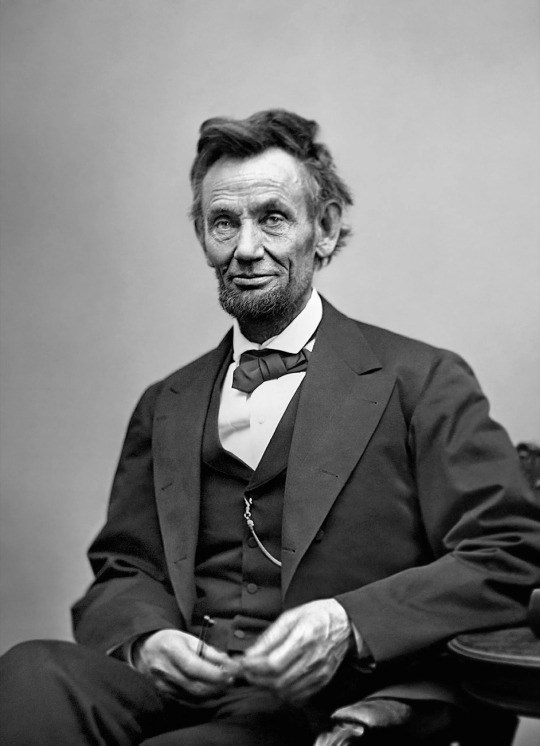
On April 9th 1865, after General Robert Lee surrendered to General Ulysses S Grant in Appotamox Virginia.
On 11th April 1865, Abraham Lincoln who was the 16th President of the United States, delivered his last ever speech.
"We meet this evening, not in sorrow, but in gladness of heart. The evacuation of Petersburg and Richmond and the surrender of the principal insurgent army give hope of a righteous and speedy peace whose joyous expression can not be restrained."
Abraham Lincoln visited Ford's theatre in Washington D.C, after deciding to take the evening off, with his wife and two friends, Clara Harris and Henry Rathbone. They arrived at 8:30pm on April 14th. However, for the last three months, unbeknownst to Lincoln or any authorities John Wilkes Booth, an actor and his co-conspirators came up with a plan to the Confederate prisoners of war.
Booth's plan along with his co-conspirators was to kidnap the president and hold him hostage until he released the prisoners, however due to the war coming to an end on 9th April their plan had to change.
Now, John Wilkes Booth along with fellow co-conspirators Mary Surrat, George Atzerodt, William Seward and David Herold decided they had to murder not only the president but members of his cabinet too.
John Wilkes Booth regularly visited Ford's Theatre and happened to know the place like the back of his hand so after finding out information earlier on the morning of April 14th that President Lincoln would be visiting the theatre later that evening the plan was set in place. Booth would head to the State Box (the presidential seating) and end Lincoln's life. Lewis Payne was tasked with killing the secretary of State, William Seward along with David Herold, it was George Azterodt's job to end Vice President Andrew Johnson's life whilst The murders were to take place at 10:15pm. Lincoln arrived at the theatre to watch a performance of Our American Cousin at approximately 8:30pm with Booth arriving outside an hour later.
Once John Wilkes Booth arrived at the rear alley on his horse, he spoke to a young boy who worked there named William Burroughs asking him to mind his horse. There was a saloon situated next to Ford's theatre and Booth needing some liquid courage for the task at hand decided to stop for a drink before heading to the theatre. He finally entered the theatre to assassinate the President at 10:07pm.
Luckily for Booth once he reached the State Box he found that Presiden Lincoln was unprotected due to his Metropolitan Police Force bodyguard, Mr John Palmer, temporarily leaving his post. Armed with a single shot Derringer and a hunting knife, Booth shot Lincoln point blank in the back of the head before stabbing his friend Henry Rathbone and jumping 11 feet, in front of 1000+ people, to the stage below. Whilst Lincoln's wife screamed Booth yelled "Thus always to tyrants" and flashed his knife.
Despite jumping 11 feet Booth was left with a broken fibula just above his ankle. President Lincoln sadly was not so lucky after the bullet entered through Lincoln's left ear, lodging behind his right eye. He was left paralyzed and struggling to breathe. He didn't regain consciousness and unfortunately died nine hours later at the Petersen House across from Ford's theatre.
After the assassination and breaking his fibula John Wilkes Booth managed to limp away, hop on his horse and gallop away. He rode his horse until he reached Surratsville so he could be joined by David E Herold at Dr Samuel Mudd's house where the Dr set Booth's leg and helped by splintering it. They stayed the night before leaving, headed south, on the afternoon of April 15th.
It only took eleven days for the Feds to catch up to Booth and Herold. When confronted Booth chose to end his own life whereas Herold surrendered.
After all the chaos and misery that they had caused, Mary Surrat, Lewis Paine, George Atzerodt and David Herold were publicly hanged at the Old Penitentiary Gallows on 7th of July 1865. Lincoln's death shook the nation and despite nobody else losing their life from their plan, Atzerodt never made any attempt on Vice President Johnson's life. Lewis Paine had been successful in harming the Secretary of State William Seward's throat after slashing it - twice!! - he only failed his mission due to Seward having a surgically inserted iron collar.
Business soon had to go back to normal as Vice President Johnson took his place as 17th President of the U.S.A.
#true crime community#tcc#true crime#murder#assassinations#lincolnassassination#follow#reblog#popular#true crime facts#tumblr#crime#crime facts#facts about crime#facts about true crime#interesting#usa#president#president lincoln#abraham lincoln#full information#interested#new facts#facts#headshot#ford theatre#death#dying#assassin
5 notes
·
View notes
Text




IMAGENES Y DATOS INTERESANTES DEL DIA 7 DE JULIO DE 2023
Día Internacional de la Conservación del Suelo, Día Mundial del Cacao, Día Internacional del Cóndor, Día Mundial del Idioma Kiswahili o Suajili, Año Internacional del Mijo y Año Internacional del Diálogo como Garantía de Paz.
San Aarón, San Cirilo de Telsalónica, Santa Edilburga y San Fermín.
Tal día como hoy en el año 1846: Con la ocupación de las ciudades mexicanas de Monterrey y San Francisco, por parte de las tropas estadounidenses, da comienzo la conquista estadounidense de California.
En 1865: En el marco de la Guerra civil estadounidense, son ahorcados cuatro de los ocho acusados por participar en la muerte del presidente de Estados Unidos, Abraham Lincoln: Mary Surratt, David Herold, Lewis Powell y George Atzerodt.
En 1917: Tras la Revolución de Febrero en Rusia, El príncipe Gueorgui Lvov forma un gobierno provisional después de la abdicación del zar Nicolás II.
En 1930: Comienza la construcción de la Presa Boulder en la cuenca del río Colorado (Estados Unidos) por el ingeniero Henry John Kaiser, ahora es conocida como Presa Hoover, en honor a Herbert Hoover, que fue presidente del país y también determinante en su construcción. Esta obra (y los acuerdos de distribución de sus agua) sirvieron para el desarrollo de toda la zona además de parte de California.
En 2005: Ocurre un atentado terrorista en Londres, en el que los atacantes explotan varios artefactos en tres vagones de metro y en un autobús urbano, provocando la muerte a 56 personas y causando más de 700 heridos. La organización terrorista Al Qaeda asumió la responsabilidad.
En 2007: En Lisboa (Portugal) se celebra la elección de las Siete Maravillas del Mundo Moderno mediante votación por teléfono o por Internet. Participaron más de 100 millones de personas y los ganadores fueron: la Gran Muralla China, el Monumento de Petra en Jordania, el Cristo Redentor en Río de Janeiro, las Ruinas de Machu Pichu, la Pirámide Chichén Itzá de México, el Coliseo Romano y el Taj Mahal en India.
En 2008: Chile y Uruguay firman un tratado de alianza para el libre comercio entre ambos países y de alianza política estratégica para conseguir mejoras de desarrollo.
En 2009: Se celebra un homenaje póstumo al cantante estadounidense Michael Jackson en el Staples Center de Los Ángeles (Estados Unidos), incluyendo un concierto que reúne a más de 100.000 personas y que convierte en su retransmisión televisiva en la más vista hasta el momento en todo el mundo, con más de 2.500 millones de espectadores.
En 2017: Se aprueba el Tratado sobre la Prohibición de las Armas Nucleares por iniciativa de la ONU. Es el primer acuerdo multilateral aplicable a escala mundial para la prohibición del armamento nuclear.
0 notes
Text
1865-Conspirators Executed
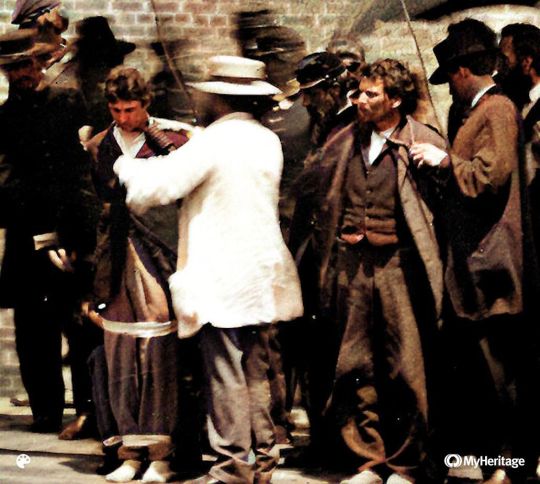
Four conspirators in the assassination of Abraham Lincoln are hanged.



David Herold — An impressionable and dull-witted pharmacy clerk, Herold accompanied Booth to the home of Dr. Samuel Mudd, who set Booth’s injured leg. The two men then continued their escape through Maryland and into Virginia, and Herold remained with Booth until the authorities cornered them in a barn. Herold surrendered but Booth was shot and died a few hours later.
Lewis Powell— Powell was a former Confederate prisoner of war. Tall and strong, he was recruited to provide the muscle for the kidnapping plot. When that plan failed, Booth assigned Powell to kill Secretary of State William Seward. He entered the Seward home and severely injured Seward, Seward’s son, and a bodyguard.

Mary Surratt— Surratt owned a boarding house in Washington where the conspirators met. Sentenced to death, she was hanged, becoming the first woman executed by the United States federal government.
George Atzerodt — German-born Azterodt was a carriage painter and boatman who had secretly ferried Confederate spies across Southern Maryland waterways during the war. Recruited by Booth into the conspiracy, he was assigned to kill Vice President Andrew Johnson, but lost his nerve and stayed in a hotel bar, drinking, instead.
1 note
·
View note
Text
George Atzerodt doodle so I can know how to draw him for a thing
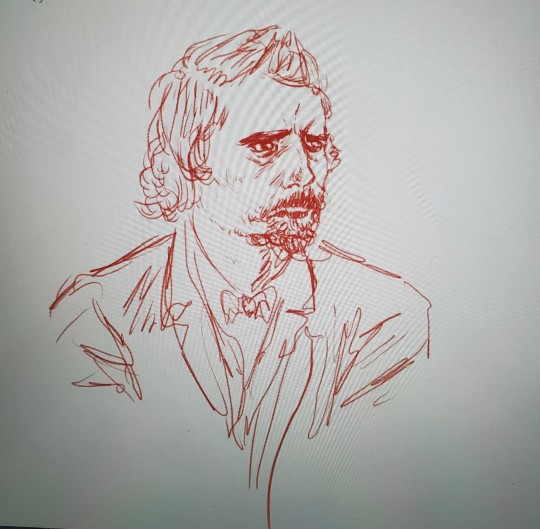
#george atzerodt#this reminds me of how i was drawing a hyper realism Guiteau and just stopped fsr#that was at least a month ago#i should finish him#but beards are hard#doodles#acctag: presidents
2 notes
·
View notes
Link
#John Wilkes Booth#abraham lincoln#assassination#conspiracy#conspiracy theory#George Atzerodt#David Herold#Samuel Mudd#Edman Spangler#Lewis Powell#Michael O'Laughlen#Samuel Arnold#Mary Surratt#John Lloyd#Louis Weichmann#liberty#freedom#slavery#Civil War
0 notes
Text
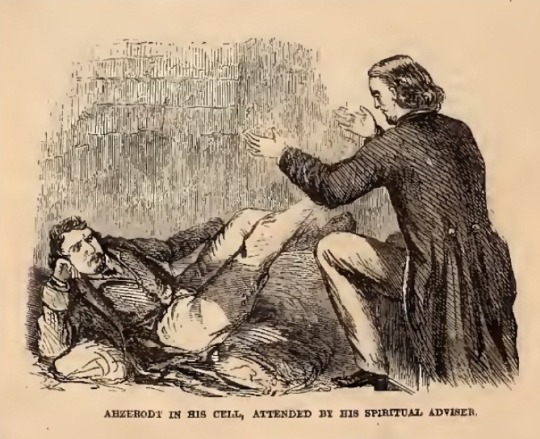
why is he reclining so sassily
6 notes
·
View notes
Text
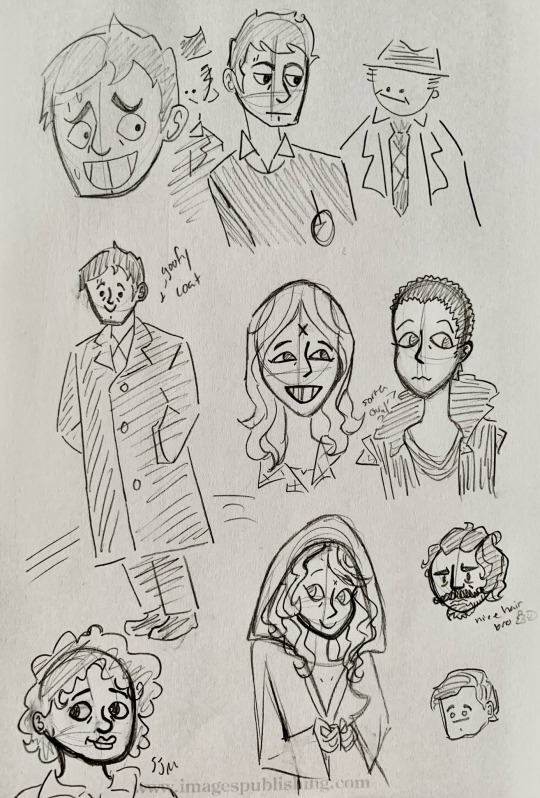
Assassination stuff
#rays art#history#assassins#lee harvey oswald#squeaky fromme#sara jane moore#george atzerodt#lewis powell
4 notes
·
View notes
Text
The Other Lincoln Assassination Conspirators
The assassination of Abraham Lincoln was not intended to be an isolated murder of the president. It was carried out as part of a larger conspiracy to destabilize the United States government by murdering its top three officials: President Abraham Lincoln, Vice President Andrew Johnson, and Secretary of State William Seward. John Wilkes Booth, the leader of the conspiracy, succeeded in assassinating the president. The other intended assassinations failed. Nonetheless, eight conspirators were tried before a Military Commission beginning on May 10, 1865, for their roles in the assassination conspiracy. (A ninth, John Surratt, fled the country.) Who were the eight people who stood trial?
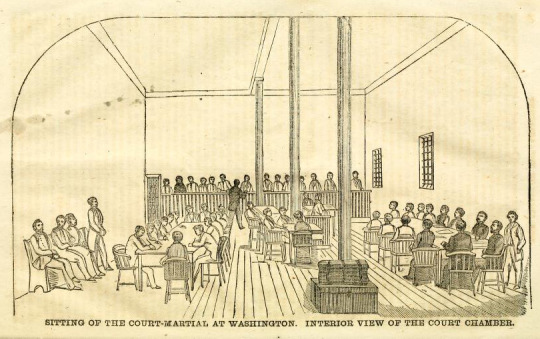
Six men were directly linked to John Wilkes Booth’s conspiracy and actions on the night of April 14th: Samuel Arnold, Edmund Spangler, Michael O'Laughlen, George Atzerodt, Lewis Powell [aka Payne], and David Herold.
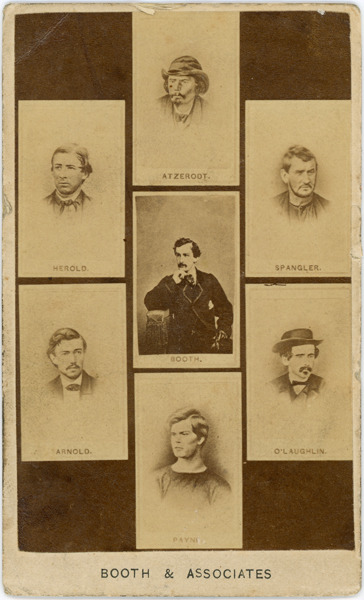
Samuel Arnold (1834-1906) had attended school with Booth. The two men remained friends, and Booth recruited Arnold to join a plot to kidnap Lincoln and take him to Richmond as a hostage to be exchanged for Confederate prisoners. Arnold enthusiastically supported the kidnap plan, but when that plan fell through, he left Washington and was not in the city on the night of April 14th. He had, however, written a letter to Booth in late March that stated, “None, no, not one were more in favor of the enterprise than myself.” Arnold’s lawyer argued that “the enterprise” Arnold supported was the proposed kidnapping not the assassination. The Military Commission did not agree and found Arnold guilty of conspiracy to assassinate the president. Arnold was sentenced to life in prison, but he was pardoned in 1869 by President Andrew Johnson. He died of tuberculosis in 1906.
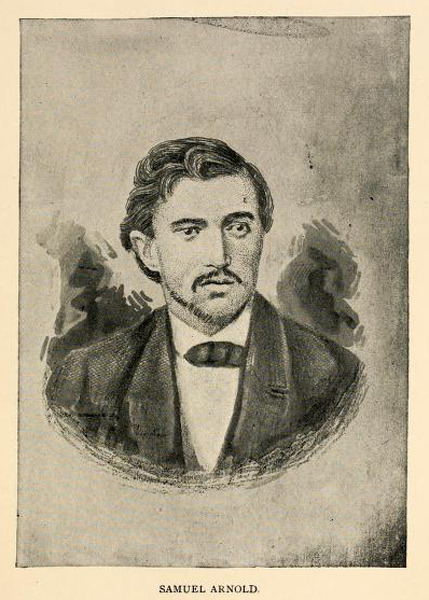
Edmund Spangler (1825-1875) was employed as a scene shifter and carpenter at Ford’s Theatre, where he became acquainted with Booth and often tended the actor’s horse when Booth was in the theater. That is what Booth asked Spangler to do the night of April 14th. That night Spangler handed that duty over to Joseph Burroughs. But after Booth shot Lincoln and ran out the back door of the theater to his horse, Spangler was accused by others at the theater of not stopping the assassin as he ran out and telling people to say nothing about Booth’s escape. His lawyer argued that Spangler had not known Booth’s intentions, but the court found him guilty and sentenced him to six years in prison. He was pardoned by President Andrew Johnson in 1869 and spent the rest of his life in Maryland on five acres given to him by Dr. Samuel Mudd.
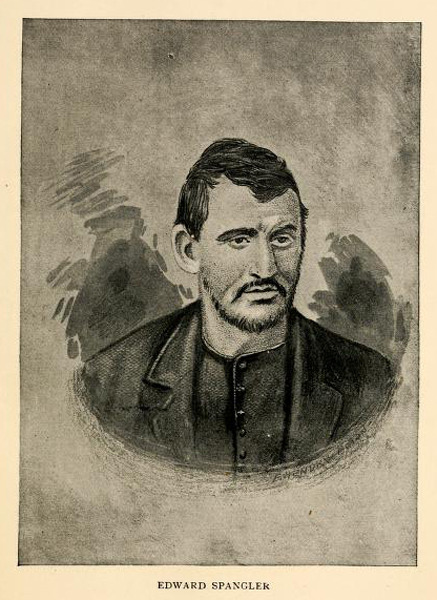
Michael O’Laughlen (1840-1867) was Booth’s Baltimore neighbor and childhood friend. He fought in the Confederate army briefly and then returned to Baltimore. In 1864 Booth recruited him for the kidnapping plot. Although it’s not clear what role he might have had in the conspiracy to kill Lincoln, he surrendered voluntarily to federal authorities on April 17th. At the trial, prosecution witnesses claimed that O’Laughlen had been seen before the assassination at Secretary of War Edwin Stanton’s house asking about the secretary’s whereabouts. His defense claimed he has spent the night of the 14th wandering Washington and drinking. O’Laughlen was found guilty of conspiracy and sentenced to life in prison at Fort Jefferson in the Dry Tortugas, Florida, where he died during a yellow fever epidemic in 1867.
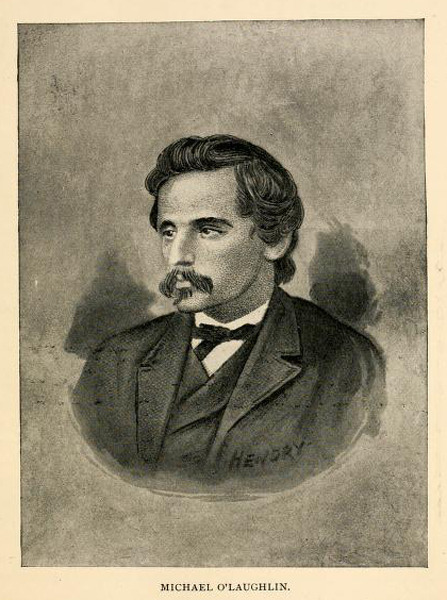
George Atzerodt (1843-1865) had actively supported the Confederacy during the war by ferrying Confederate spies across the Potomac. He was a carriage repairman by trade and had been recruited by Booth to join the kidnapping plot. When the plot turned to assassination, Booth assigned Atzerodt the job of assassinating Vice President Johnson. On April 14th the would-be assassin checked in to Johnson’s hotel where he stashed a revolver and bowie knife in his room. He then proceeded to the hotel bar where he asked a bartender about Johnson’s whereabouts and began drinking to build up his courage. He never looked for Johnson but visited at least one other hotel bar, got drunk, and spent the night wandering around Washington. A search of Atzerodt’s room on April 15th made him a prime conspiracy suspect. He was arrested on April 20th. Although his lawyer called witnesses who confirmed that Atzerodt was a “notorious coward” unable to assassinate anyone, Atzerodt was found guilty of conspiracy and sentenced to death. He was hanged on July 7, 1865.
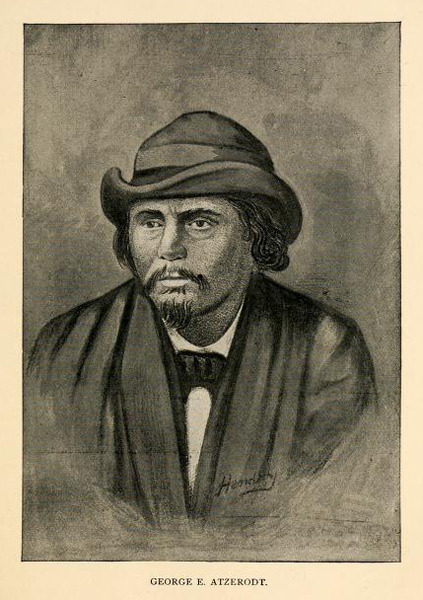
Lewis Powell (1844-1865), also known as Lewis Payne, joined the Confederate army at age 17, was wounded at Gettysburg, captured, and transferred to a hospital in Baltimore. He escaped from the hospital, joined the Confederate Mosby’s Rangers, and became involved with the Confederate Secret Service. By January 1865, Powell had returned to Baltimore, claiming to be a deserter, and taken the Oath of Allegiance to the Union under the name Lewis Payne. He was introduced to Booth by John Surratt, and Booth recruited him to provide the muscle for the original plot to kidnap Lincoln. Booth then assigned Powell to kill Secretary of State William Seward. Powell very nearly succeeded, forcing his way into Seward’s house and severely injuring Seward’s son, his bodyguard, and Seward himself. He then escaped but was arrested two days later at Mary Surratt’s boardinghouse. At his trial, Powell’s lawyer argued that he was a delusional and misguided “fanatic” whose life should be spared. It was not—Powell was found guilty and hanged on July 7, 1865.
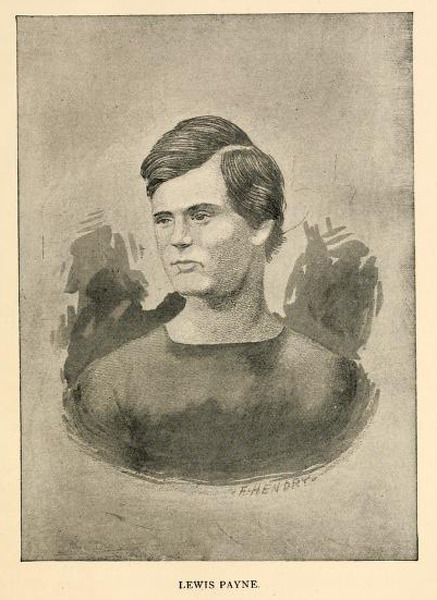
David Herold (1842-1865), a pharmacy clerk in Washington, D.C., had been a schoolmate of John Surratt, who introduced him to Booth in 1864. Booth recruited him for the kidnapping plot, and he remained a conspirator when the plot turned to assassination. On the night of April 14th, Herold went with Lewis Powell to Secretary Seward’s house. While Powell was inside attacking Seward, Herold was supposed to stand outside and hold Powell’s horse. But he lost his nerve and abandoned Powell, leaving the horse tied to a tree. He made his way to Maryland where he met up with Booth. The two men went first to Surrattville to retrieve weapons hidden there and then on to the home of Dr. Samuel Mudd, who set Booth’s broken leg. Herold and Booth remained on the run until April 26th when Union cavalry trapped them in a barn on Richard Henry Garrett’s farm. Herold surrendered when soldiers set the barn on fire. Since Herold had declared “We are the assassinators of the President” as he passed the guard on the bridge to Maryland, there was little doubt about the outcome of his trial. His lawyer attempted to portray Harold as simple—possibly simple-minded—“boyish” and easily influenced by the sophisticated Booth who “exercised unlimited control over this miserable boy, body and soul.” The argument failed to save Herold from a guilty verdict and death sentence. He was hanged on July 7, 1865.
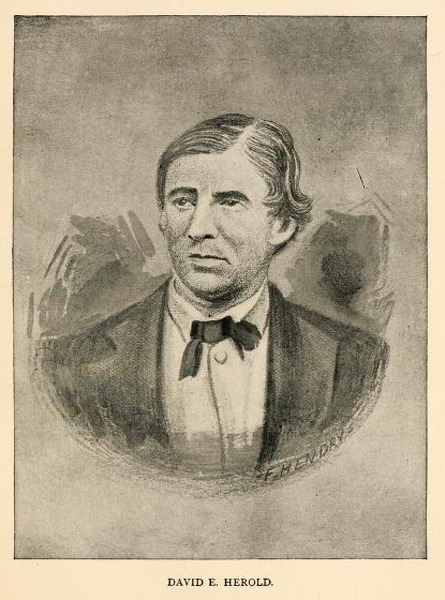
In addition to the six men recruited by Booth, Dr. Samuel Mudd and Mary Surratt were accused of aiding the conspirators. Their roles in the assassination conspiracy were controversial at the time and have remained so ever since.
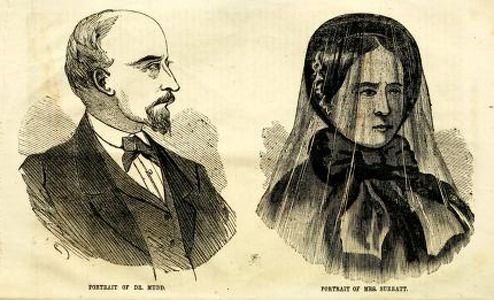
Dr. Samuel Mudd (1833-1883) practiced medicine on his farm outside Bryantown, Maryland. He supported the Confederacy and was open about his dislike of the Lincoln administration. Early on the morning of April 15th, Booth and Herold arrived at Mudd’s farm, and the doctor set Booth’s broken leg. He then had crutches made for Booth and directed the two fugitives to their next destination. When soldiers arrived in pursuit of Booth, Mudd claimed he had not known the man whose leg he had set and did not recognize photographs of Booth. At his trial, a number of witnesses testified that Mudd knew and associated with both John Surratt and Booth before the assassination. The prosecution argued that the doctor had aided the conspiracy by treating the injured Booth and directing him further along his escape route. Mudd was convicted and sentenced to life in prison at Fort Jefferson in the Dry Tortugas, Florida. Mudd’s actions treating inmates and staff at the prison during the 1867 yellow fever epidemic helped earn him a pardon from President Andrew Johnson in 1867. After his release, Mudd returned to Maryland where he died of pneumonia in 1883.
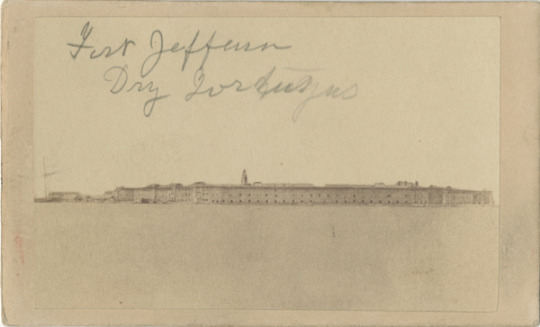
Mary Surratt (1823-1865) owned a boardinghouse in Washington where Booth visited quite often and the conspirators met. Her son, John Surratt, was a Confederate agent and a conspirator. She also owned a tavern in Surrattsville, where she had told her tenant to hide weapons for later pick up and where she met and talked with Booth on April 14th. Booth also appeared at her Washington boardinghouse early on the evening of April 14th, and he and Herold retrieved the hidden weapons from her tavern later that night as they made their escape. Powell appeared at the boardinghouse late on the night of April 17th while federal investigators were interviewing her. Mary Surratt was arrested following that interview. At her trial she was found guilty and sentenced to death. Five of the nine Commissioners who heard her case recommended that President Andrew Johnson reduce her sentence to life in prison, but Johnson refused. Mary Surratt was hanged on July 7, 1865—the first woman executed by the United States government.
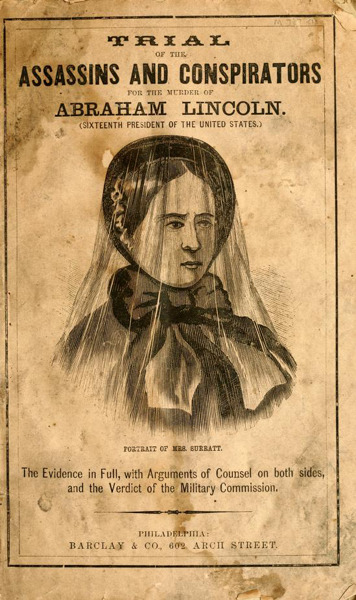
#Lincoln Assassination#Lincoln Conspirators#Samuel Arnold#Edmund Spangler#Michael O’Laughlen#George Atzerodt#lewis powell#David Herold#Dr. Samuel Mudd#Mary Surratt
5 notes
·
View notes
Text
The Kirkwood Hotel: Johnson and Atzerodt
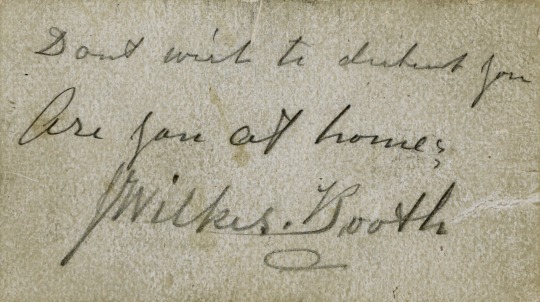
Shortly after ten o’clock p.m. on April 14, 1865, armed with a knife and pistol, George Atzerodt walked into the Kirkwood House and took a seat at the bar. Sometime before, Atzerodt, following orders from John Wilkes Booth, rented a room at the hotel one floor above the vice president’s who was temporarily living at the Kirkwood House after moving to Washington a month before for the inauguration.
Vice President Andrew Johnson, alone and unguarded, had already retired for the evening by the time Atzerodt arrived. All Atzerodt needed to do was knock on Johnson’s door and shoot him point-blank the moment the door opened.
Fortunately for Johnson, Atzerodt needed a bit of liquid courage from the hotel bar before committing murder. The more he drank, the worse the plan sounded to him and the less he wanted to be part of it. Rather than assassinating the vice president as instructed, Atzerodt lost what little courage he possessed, abandoned Booth’s insidious scheme, left the hotel, and wandered around Washington aimlessly for several hours.
Within minutes of Lincoln’s assassination, Johnson learned of the president’s fate because he happened to be staying at the same hotel as Leonard Farwell, a former governor of Wisconsin, who was in the audience at Ford’s Theatre that evening.
After Lincoln was shot, Farwell, anxious about Johnson's safety (particularly after reading a widely circulated advertisement from the Selma Dispatch in December in which a Southerner offered to kill the president, the vice president, and the secretary of state in return for a million dollars) rushed to Johnson’s residence.
When Farwell arrived at the Kirkwood House he found Johnson asleep in his bed, completely unaware of what had transpired at Ford’s Theatre and at Seward’s residence in Lafayette Park.
Photo credit to the National Archives
2 notes
·
View notes